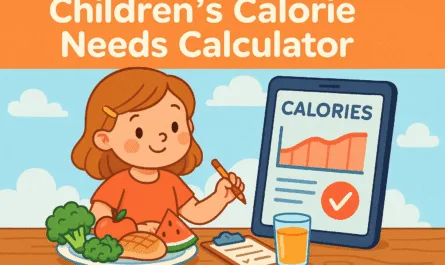Calorie Calculator for Kids How to Ensure Healthy Growth and Development
As parents, guardians, or caregivers, one of our primary responsibilities is ensuring that our kids are growing up healthy, strong, and nourished. A key part of this responsibility is understanding how many calories children need to thrive. With childhood obesity becoming an increasing concern, it is important to find a healthy balance and ensure your child gets the right amount of calories for their age, activity level, and overall health. This is where a Calorie Calculator for Kids can make a world of difference.
In this blog post, we will dive into how a Calorie Calculator for Kids works, why it’s essential to use one, and how it can help guide your child’s nutritional needs. We’ll also explore the factors that affect your child’s caloric needs, and provide practical tips for using a Calorie Calculator for Kids effectively.
Why is Calorie Intake Important for Kids?
Calories are a measure of the energy your child gets from food and drink. Just like adults, children need a certain amount of calories daily to fuel their bodies, promote growth, and support cognitive development. However, the number of calories your child requires varies depending on various factors such as age, sex, height, weight, activity level, and even their overall health.
Getting the right amount of calories is important for kids’ physical and mental development. Too many calories can lead to unhealthy weight gain, while too few can stunt growth and development. Therefore, using a Calculator for Kids is a practical way to ensure that children are meeting their nutritional needs without over or under-consuming calories.

How Does a Calorie Calculator for Kids Work?
A Calorie Calculator works by taking specific information about your child and providing an estimate of how many calories they should be consuming each day. Most calculators ask for details such as:
- Age: Kids have different calorie needs at different stages of their development.
- Sex: Boys and girls may have slightly different calorie requirements.
- Weight: A child’s weight can affect their energy requirements.
- Height: Taller children typically need more calories than shorter children.
- Activity Level: Active kids will need more calories to support their energy levels and muscle growth.
Once you input this information into a Calorie Calculator for Kids, the tool provides a personalized estimate of the daily calorie intake your child should aim for to maintain a healthy weight.
Why Use a Calorie Calculator for Kids?
There are many benefits to using a Calculator. Here are just a few:
Personalized Recommendations: Every child is unique. A Calorie Calculator for Kids helps you tailor nutrition to your child’s specific needs, ensuring they get the right amount of energy for their age, size, and activity level.
Prevent Overeating or Under-Eating: Sometimes, it’s easy for parents to underestimate or overestimate how many calories their children need. A Calorie Calculator provides a more accurate and data-driven estimate.
Support Healthy Growth: Kids are constantly growing, and their energy needs change as they develop. A Calorie Calculator for Kids can help you adjust their intake as their body goes through different growth phases, supporting healthy physical and mental development.
Boost Healthy Habits: By using a Calorie Calculator for Kids, you can set realistic goals for your child’s diet and help them establish healthy eating habits early on. With proper calorie intake, they can maintain a healthy weight, improve their athletic performance, and feel more energized throughout the day.
Fight Childhood Obesity: Childhood obesity is a growing concern, and one of the best ways to address it is through proper education. By using a Calorie Calculator for Kids, parents can better understand their child’s nutritional needs and work to prevent overeating.
Factors that Affect Your Child’s Calorie Needs
It’s important to understand that not all kids are the same, and several factors influence how many calories your child needs. Here are some of the most common factors that affect calorie requirements.
Age: As children grow, their calorie needs increase. Babies and toddlers need fewer calories than older children and teenagers, who are going through more rapid growth.
Gender: Boys generally require more calories than girls, especially during their growth spurts in adolescence. This is because boys tend to have more muscle mass, and muscle tissue requires more energy to maintain than fat tissue.
Activity Level: Kids who are more active, whether through sports, outdoor play, or other physical activities, will need more calories to sustain their energy levels. On the other hand, kids with a sedentary lifestyle may require fewer calories.
Height and Weight: Taller children or those who weigh more typically need more calories to support their bodies. However, it’s important to note that height and weight alone don’t determine caloric needs—they need to be considered along with other factors like age and activity level.
Health and Medical Conditions: Children with medical conditions may have different calorie needs. For example, children with hyperthyroidism may require more calories, while children with conditions like cystic fibrosis may have trouble absorbing nutrients and need a different balance.
Practical Tips for Using a Calorie Calculator for Kids
Now that we understand how a Calorie Calculator for Kids works, let’s take a closer look at some practical tips for using it effectively.
Be Accurate with Your Inputs: To get the best results, make sure you input accurate information. Measure your child’s weight and height regularly, and keep track of their activity levels. If they are involved in physical activities or sports, take that into account as well.
Reevaluate Regularly: As your child grows, their caloric needs will change. Recalculate their calorie needs periodically using the Calorie Calculator for Kids to make sure they are getting the appropriate amount of energy.
Focus on Nutrient-Dense Foods: While calories are important, the quality of those calories matters just as much. Make sure your child is getting a well-balanced diet full of fruits, vegetables, whole grains, lean proteins, and healthy fats. This will ensure that the calories they’re consuming are helping their growth and health.
Encourage Regular Exercise: A Calorie Calculator for Kids takes activity level into account, but it’s always a good idea to encourage your child to stay active. Whether it’s through sports, outdoor play, or family walks, physical activity is crucial for a child’s health and can also help them manage their weight.
Consult a Professional: If you have concerns about your child’s diet or weight, it’s always a good idea to speak with a pediatrician or nutritionist. They can provide you with expert advice tailored to your child’s specific needs.
Conclusion
Using a Calorie Calculator for Kids can be a powerful tool in ensuring that your child is getting the right amount of calories to grow and develop in a healthy way. By considering factors such as age, sex, activity level, and overall health, a Calorie Calculator for Kids can help you personalize your child’s nutrition plan and make better-informed decisions about their diet. Whether you’re aiming to prevent childhood obesity or promote healthy growth, a Calorie Calculator for Kids offers a simple yet effective way to monitor your child’s nutritional needs.
Remember, every child is unique, and finding the right balance of calories is key to supporting their health and well-being. Keep track of their calorie needs with a Calorie Calculator for Kids, ensure they are getting the right nutrients, and most importantly, support them in developing healthy habits that will last a lifetime.
By using a Calorie Calculator for Kids, you can help your child develop a positive relationship with food and set them on a path to a healthy, active life.



